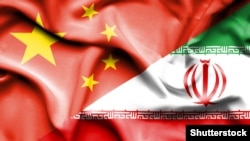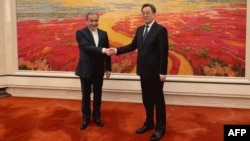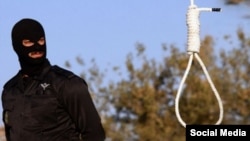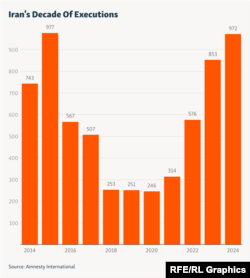
Welcome back to The Farda Briefing, an RFE/RL newsletter that tracks the key issues in Iran and explains why they matter.
I'm RFE/RL correspondent Kian Sharifi. In this edition, I'm looking at how Iran is seeking to reassure China that, even with a nuclear deal in place with the United States, Beijing will remain a key partner for Tehran.
What You Need To Know
• China Ties A Priority Even Amid Nuclear Progress: Iranian Foreign Minister Abbas Araqchi traveled to China this week, days ahead of a third round of nuclear talks with the United States in Oman. This trip underscored Tehran's commitment to deepening ties with Beijing, signaling that even if a deal is reached with Washington, relations with China will not be compromised.
• New Tunnels Grab IAEA's Attention: The Institute for Science and International Security on April 23 revealed, using satellite imagery, that Iran has set up a new security perimeter around a "new, large, deeply buried tunnel complex" near the Natanz nuclear site. The tunnels are located beneath Mount Kolang Gaz La, south of Natanz. Rafael Grossi, director general of the International Atomic Energy Agency (IAEA), stated that he has repeatedly raised concerns over the tunnels with Iran, but Tehran claims it was not under any obligation to inform the agency. Grossi said it "cannot be excluded" that the tunnels could store undeclared nuclear material.
• Looking To Reconnect With European Powers: Araqchi wrote on X that relations with the E3 are at a low point and urged renewed diplomacy, offering visits to Paris, Berlin, and London. His comments on April 24 come as the E3 (Britain, France, Germany) have been sidelined from current Iran-US nuclear talks, with mediation now led by Oman. The E3 have threatened to trigger the reimposition of UN sanctions on Iran by the end of June if no agreement is reached on Tehran's nuclear program.
The Big Issue
Iran's China Play Won't Change
Araqchi's April 23 visit to Beijing underscored Tehran's commitment to its strategic partnership with China, regardless of progress in nuclear talks with the United States.
Araqchi carried a message from Iranian Supreme Leader Ayatollah Ali Khamenei to President Xi Jinping, reaffirming that the Iran-China relationship is a long-term priority and will not be affected by developments with Washington. Notably, Araqchi traveled to Russia a week ago, ahead of the second round of talks with the United States, and handed over a message from Khamenei to Russian leader Vladimir Putin.
Both Tehran and Beijing pledged to deepen economic and political ties, fast-track a 25-year cooperation pact, and coordinate closely on regional and global challenges.
Why It Matters: China is Iran's largest trading partner and a crucial diplomatic ally, especially as Tehran faces Western sanctions.
For Iran, China offers investment, technology, and a reliable market for its energy exports, while providing political backing in international forums.
For China, Iran is a vital link in its Belt and Road Initiative and a key player in Middle Eastern energy security.
Damon Golriz, a lecturer at The Hague University of Applied Sciences, said Iran is enhancing its relations with Russia and China because it believes the United States's status as a superpower is on the decline.
He told RFE/RL's Radio Farda that Tehran wants to reassure Moscow and Beijing that "agreements with America will not harm Russia and China's interests in Iran."
The message is that "not only will they keep their special place in Iran, but Tehran will also help Russia and China to accelerate America's decline," Golriz added.
China and Russia have both reaped advantages from Iran's tensions with the United States, with Beijing snapping up discounted Iranian oil and Moscow deploying Iranian drones in Ukraine. But if those tensions escalate further, the fallout could be something both powers would rather avoid.
China relies heavily on energy imports, with 16 percent of its oil in March coming from Iran. But its interest in Iran extends beyond oil. If sanctions are lifted, Iran's need for investment in railways and ports, among others, could benefit Chinese companies.
Crucially, over 40 percent of China's energy comes through the Persian Gulf. For Beijing, any military escalation in the region isn't just a geopolitical concern -- it's a direct threat to its energy security and economic stability.
What's Being Said: At the end of his trip, Araqchi wrote on X in Chinese that no matter how the global landscape shifts, "Iran will always see China as a trustworthy and reliable partner."
Taking a dig at the West, Iran's ambassador to China, Mohsen Bakhtiar, said Tehran and Beijing "both stand for international law and multilateralism and see strong-arm tactics as a threat to friendly ties between nations and South-South cooperation."
Expert Opinion: Golriz said the Islamic republic sees its survival as tied to strong relations with Russia and China, which is why Araqchi is tasked not only with securing a deal with Washington to lift sanctions but also with maintaining those strategic ties.
"But I believe this is a very difficult balancing act -- trying to satisfy Russian and Chinese interests on one side, and American demands on the other. Still, if that balance is achieved -- especially by moving closer to the West -- it would ultimately serve the national interest more than the interests of the Islamic republic."
That's all from me for now.
Until next time,
Kian Sharifi
If you enjoyed this briefing and don't want to miss the next edition, subscribe here . It will be sent to your inbox every Friday.






